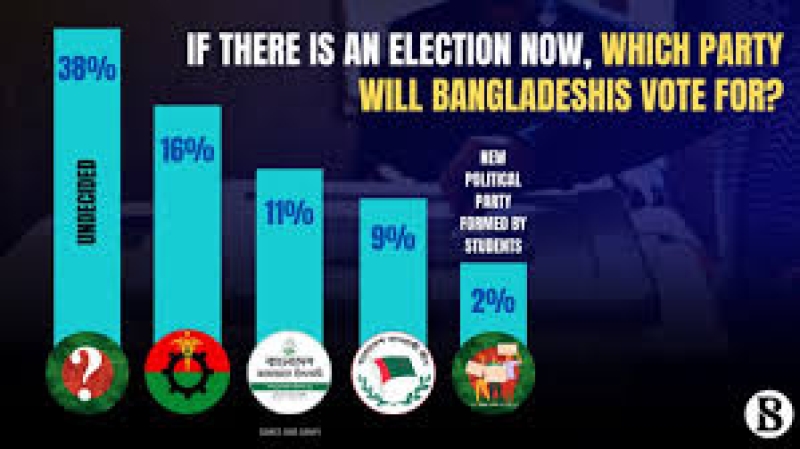- 2025: Resilient Economies, Smart Development, and More Jobs |
- Dhaka rejects India's statement on incident at BD HC residence, New Delhi |
- Stocks end lower; trading falls at DSE, improves at CSE |
- No need to be kind to election disruptors: EC to law enforcers |
- No Media Faced Arson Attacks in 53 Years: Mahfuz Anam |
38% of Bangladeshis Remain Undecided on Election Choices: Survey

A recent survey has revealed that 38% of Bangladeshis remain undecided about their choice of candidate or party in the event of an election.
The survey, conducted between October 15 and October 31, 2024, by the BRAC Institute of Governance and Development (BIGD) of BRAC University, found that 16% of respondents would vote for the Bangladesh Nationalist Party (BNP), 11% for Jamaat-e-Islami, and 9% for the Awami League, which was ousted following a mass uprising on August 5.
Meanwhile, 2% of participants said they would support any new political party formed by students, and just 1% indicated their preference for the Jatiya Party. The survey, titled "Pulse Survey on Citizens' Perceptions, Expectations, and Experiences," was based on data gathered from 4,158 people, representing both rural (51%) and urban (49%) populations, through a nationwide telephone survey.
The findings were disclosed at an event hosted by BIGD at the Press Institute of Bangladesh (PIB) in Dhaka on December 12. During the presentation, it was revealed that the July uprising had sparked a surge in public expectations for political change. However, when these expectations were not met in August, concerns about the country's future began to rise.
The survey results showed that 56% of respondents believe Bangladesh is on the right track, while 34% feel the country is moving in the wrong direction. These numbers contrast sharply with the findings from the previous BIGD Pulse Survey conducted in August 2024, where 71% expressed optimism about Bangladesh's political future, and only 12% voiced pessimism.
Mirza M Hassan, head of BIGD's governance and politics cluster, explained, "The revolution in July sparked heightened expectations, but when those expectations were not fulfilled, people grew anxious about their future." He emphasized that the government needs to openly address public concerns when implementing institutional reforms.
Speaking at the event, Shafiqul Alam, the chief adviser's press secretary, reminded the audience that this is the fourth month of the interim government's tenure, which has inherited a struggling economy and political system. "We are acting as facilitators for reform, creating space for everyone to participate," he said.
Farukh Wasif, director general of PIB, stated that while the interim government has faced numerous challenges, it did its best to manage them. He noted that following the July uprising, the government’s messaging created a sense of optimism, which raised public expectations that were not fully realized. "The inflation of expectations needs to be reconsidered in light of the government's communication," he suggested.
Other prominent speakers at the event included Anu Mohammad, professor of economics at Jahangirnagar University, Imran Matin, executive director of BIGD, and Firdous Azim, chairperson of the Department of English at BRAC University. The event was moderated by Syeda Salina Aziz, a fellow in BIGD’s Politics and Governance cluster, with contributions from Ahmad Ahsan, director at the Policy Research Institute of Bangladesh, and Mohammad Aynul Islam, associate professor of Political Science at the University of Dhaka.

